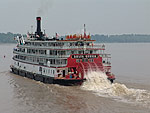Thanks to Trent, I was reminded of something that I have always considered to be the most important fact about 9/11, yet which is rarely mentioned in these terms:
The only part of the American national security establishment that successfully defended America on 9/11 was the portion of the reserve militia on board Flight 93, acting without orders, without hierarchy, without uniforms or weapons, by spontaneous organization and action.
Most people don’t even know they are part of the reserve militia.
But the genius of the Founders lives on in this legal category, which recognizes that the ultimate responsibility for the defense of the country rests on and in the people. The standing Army, and the organized militia (National Guard) are the main line of defense, but the people are an army in latent form, the ultimate defense force, as any democratic people should be and must be.
This article, entitled The Militia And The Constitution: A Legal History, is very good. it establishes the deep roots of the militia concept, down to the American founding. Buried in the last footnote, it says:
The United States technically continues to have a national “general” militia, consisting of all able-bodied males between the ages of 17 and 45 years of age who are not members of the National Guard or the Naval Militia. 10 U.S.C. § 311 (West Supp.1989). Likewise, state codes contain provisions establishing general “unorganized” militias. See, e.g., VA. CODE ANN. § 44-1 (Michie Supp.1989). For practical purposes, however, these “organizations” have ceased to play any real role in national defense.
(emphasis added) But look how wrong, how 20th Century, that last comment is. In the era of mass armies, the “practical purposes” of national defense did not have a place for the “reserve militia”. But in an era of scattered, seemingly random, attacks, by terrorists and saboteurs, the only reasonable hope to thwart, contain, defeat and respond to these modern enemies is if the population at large is resilient and mentally and physically prepared — and armed — to respond to the surprise and the initiative of the enemy, as the Flight 93 passengers did. For practical purposes, on 9/11 the “general militia” far from “ceasing” to play a “real role in national defense”, was the only “organization” that successfully played any role in national defense.
(The spontaneous evacution of Manhattan by ship and boat owners was a similar bottom-up response.)
The lessons of 9/11 have been left unlearned for eight years in America.
These lessons contradict most of what people claim to know about America, modernity, and how the world works.
Bottom-up, inductive, spontaneous self-organization is the essence of America.
It works in all fields when it is allowed to do so.
UPDATE: Jim Bennett wrote to remind me of his observation, “The Era of Osama lasted about an hour and a half or so, from the time the first plane hit the tower to the moment the General Militia of Flight 93 reported for duty.” Jim’s UPI column appears not to be online (why not?), but Mark Steyn quotes him here. We Anglospherists take the long view on these issues.
